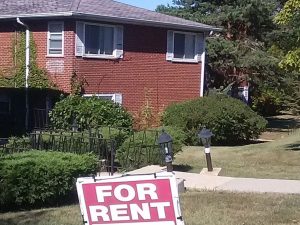Woodstock City Council shelves landlord ordinance
By Gregory Harutunian For Chronicle Media — October 10, 2017
The Woodstock City Council hear opposition to its landlord registration program, during an initial public airing, at its Oct. 3 city council meeting. (Photo by Gregory Harutunian/for Chronicle Media)
No action was taken on a proposed City of Woodstock Landlord Registration Program, as more than 100 people attended the Oct. 3 city council session, which was moved to Woodstock High School in order to accommodate the crowd.
The initial public hearing on the initial details drew opposition, chiefly for imposing graduated registration fees upon residential property owners tantamount to the number of units owned and a four-year cycle of site inspections.
“Bear in mind, this was an initial public hearing to present the program for public input,” said Woodstock Mayor Brian Sager. “The city council members chose to not take action on the program, and we are discussing a voluntary landlord registration program. They have to review and tweak the details, along with a process to implement it. There is no timetable for the measure to be introduced, so this is a case of going back to the drawing board.”
The program grew out of considerations made nearly a decade ago, as city council members sought a means to keep landlords responsible for the maintenance of their properties through code changes, resulting from complaints made to the city’s Building and Zoning Department. The program, as presented, charged registration fees of $15 for a residential landlord with 1-10 units, $30 for 11-20 units, and $50 for 21 or more units.
Additionally, the program would mandate that units would be inspected every four years by code enforcement officers from the building and zoning department with a potential provision that may extend a two-year period, prior to the next inspection date, for units that contain no violations, or less than five infractions.
“There was opposition to the plan, and the city council withdrew it,” said Woodstock Building and Zoning Director Joe Napolitano. “This is a city council that is responsive to its constituents. Time and again, from the mayor to the individual council members, they have shown their willingness to act on behalf of the community, and take their direction.
“As I understand, the mayor is looking at a volunteer landlord registration program, with no fees, because this is the feedback that was received. Moving the council meeting, from the chambers to the high school, was also a response to the community predicated on emails that were sent and leaned toward a large turnout.”
Initially, Woodstock officials had discussed a landlord maintenance-compliance program, based on tenant complaints. The 2017 proposal was also seen as a crime deterrent for neighborhoods through inspections. The concept was offered during a summer visioning workshop, and indicated a lease provision that the tenant could be evicted by the landlord or the city for engaging in criminal activities at the rental site.
Such programs found a gateway in January, when a special census found a population total of more than 25,000. It brought the designation of a home-rule community.
“This (landlord) initiative was started several years ago, a response to complaints from renters, but because Woodstock was not a home-rule community, there were restrictions on what the city could do, with respect to programs established by the municipality,” said Napolitano. “Last January, the special census gave us the minimum 25,000 population total required for the home-rule designation.
“As a result, there is a stronger basis to act on behalf of our community,” he said.
While the registration program dealt solely with residential landlords, there was no initiative to extend the proposal to commercial rental properties, with the same rigorous inspections schedule, fee payment, and compliance demands.
“What transpired at the meeting regarding landlord registration and fees was strictly about residential properties, not commercial rental properties,” said Garrett Anderson, the city’s economic development director. “That discussion has not even taken place, and remains in process … although not even in the foreseeable future.”
The revitalization of commercial entities within the Woodstock areas, as part of its joint enterprise zone boundaries with Harvard and unincorporated McHenry County, has begun to bear fruit. Anderson indicated the impact of the enterprise zone has generated activity in the form of business expansions, and new commercial development.
“Casey’s General Store, with a gas station, is going up along Route 14 … there’s also a retail mall by the Farm and Fleet store that will include more amenities,” he said. “The zone was established to invigorate the business climate, and it’s moving forward successfully.”
— Woodstock City Council shelves landlord ordinance —-



